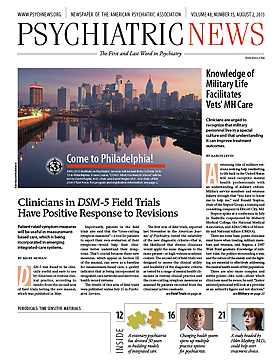Psychologists are prescribing psychotropics with medical supervision in Louisiana and New Mexico and in some military contexts. Their effort to add Illinois failed for now (Psychiatric News, June 20), but a related issue deserves some thought. Prescription psychotropics are advertised widely by pharmaceutical companies on television. “Ask your doctor” does not refer to psychiatrists: we are only 4 percent of physicians. Such ads, illegal everywhere except the United States and New Zealand, encourage patients and physicians to make drugs the option of first resort. Now we find that our rivers and streams have measurable levels of antidepressant residues (Science, February 15)!
When in practice, I rarely prescribed medication in the initial visit, since many patients benefit immediately from a session focused on history and current relationship issues. Relatively few physicians have the time, interest, and skill to do this. Even psychiatry residency training may not provide enough attention to interviewing and psychotherapy skills. APA should be as concerned with this as we are with psychologists prescribing psychotropics.
E. JAMES LIEBERMAN, M.D.Potomac, Md.
Response from Christopher Thomas, M.D., chair of the Review Committee for Psychiatry of the Accreditation Council for Graduate Medical Education (ACGME):
The current ACGME Program Requirements for General Psychiatry expect that all programs provide training for residents to “develop competence in: formulating a clinical diagnosis for patients by conducting patient interviews, eliciting a clear and accurate history,” and “applying supportive, psychodynamic, and cognitive-behavioral psychotherapies to both brief and long-term individual practice.” In addition, the current draft of the Psychiatry Milestones for Residency Training that are in development give special attention to the development of psychotherapy skills and knowledge under the competencies for patient care and medical knowledge. Additional attention to interviewing skills are specifically focused on in the Psychiatry Milestones competencies for psychiatric evaluation under the competencies for patient care and relationship development under the competencies for interpersonal communication skills.
Along with the ACGME standards, the American Board of Psychiatry and Neurology requires all applicants for certification to have passed three Clinical Skills Verification Exams that measure a clinician’s competence in the ability to form rapport and elicit essential information during evaluation interviews with real patients. These exams are conducted by residency training programs, usually as part of the ACGME-required annual assessment of residents’ clinical skills and are being incorporated as an assessment for the Psychiatry Milestones.
While there are always pressures to take shortcuts, interviewing skills and psychotherapy remain a vital part of all psychiatry residents’ training, and the ACGME’s Review Committee for Psychiatry will continue to promote the best education for psychiatry residents.
Response from Richard Summers, M.D., chair of APA’s Council on Medical Education and Lifelong Learning and past president of the American Association of Directors of Psychiatric Residency Training (AADPRT); Adrienne Bentman, M.D., president of AADPRT; and Deborah Hales, M.D., director of APA’s Division of Education:
We salute Dr. Lieberman’s reminder about the importance of genuine rapport between doctor and patient, a thorough clinical history, and a truly biopsychosocial perspective on diagnosis and treatment. APA’s Council on Medical Education and Lifelong Learning and AADPRT are committed to robust training in psychotherapy for all psychiatry residents.
While our roles as psychiatrists are changing and will continue to change with the transformation of the American health care system, the preservation of psychotherapy training and development of relational skills in our residents is critical. This will enhance their compassion and understanding, increase their therapeutic alliance-building skills, improve treatment compliance, and allow better collaboration with interdisciplinary teams, especially for those complex patients for whom we will be especially responsible. These skills are core to our identities.
We are supported in this endeavor by the new Psychiatry Milestones that are being finalized this year by the Review Committee for Psychiatry of the ACGME. These educational requirements define the knowledge and skills in supportive, psychodynamic, and cognitive-behavioral therapy residents must achieve. They are strong and well-written.
AADPRT has a standing Psychotherapy Task Force that develops innovative curricular ideas, a monthly “Psychotherapy Training Tip” sent to all training directors, a wide variety of psychotherapy-focused workshops at its annual meeting, and a long track record of advocacy for psychotherapy training.
APA has promoted a variety of psychotherapy training materials, including a wide range of American Psychiatric Publishing books, online materials, and CME opportunities.
Happily, program directors see the continued interest of residents in psychotherapy and maintain this focus as they balance all of the educational needs and requirements. We look forward to maintaining our commitment to psychotherapy training for psychiatrists as we prepare for our roles in a changing world. ■
